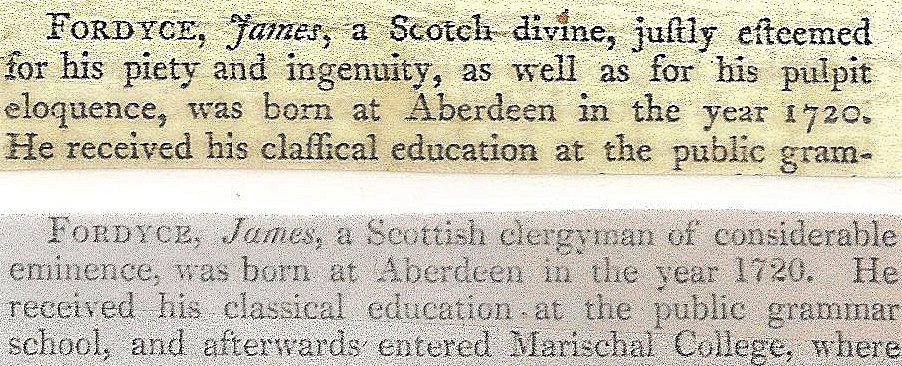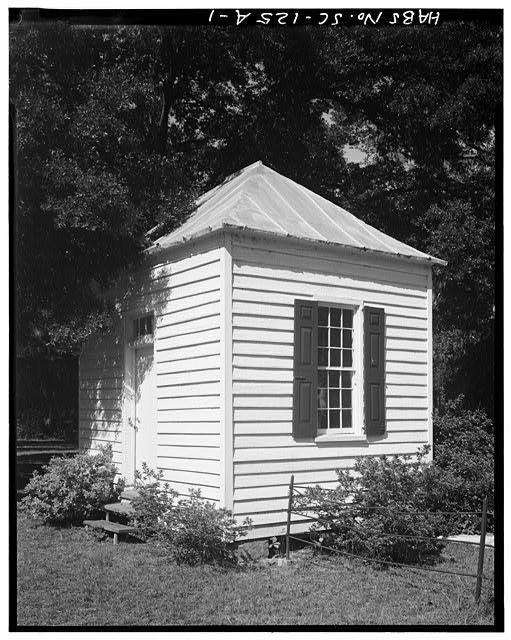|
Salem Black River Presbyterian Church
Salem Black River Presbyterian Church (Brick Church) is a historic church in Sumter, South Carolina. History This house of worship, commonly called Brick Church, was founded by Scotch-Irish settlers in 1759 on land given by Capt. David Anderson. Original log meeting house was replaced by frame building and named Salem Presbyterian Church in 1768. The first Brick Church was built in 1802 and used until 1846 when the present church was built of brick made on the grounds. The Old Session house (1846) in the rear contains a large library given by James McBride Dabbs James McBride Dabbs (May 8, 1896 – May 30, 1970) was an American author and farmer from South Carolina known for his writings on religion and Southern culture. He has been recognized as one of the South's leading liberals during his time. Dabbs ... in 1862. Land for the cemetery, dating from 1794 was deeded by Robert Witherspoon in 1830. Among the notable ministers to serve this church was Dr. Thomas Reese, sch ... [...More Info...] [...Related Items...] OR: [Wikipedia] [Google] [Baidu] |
Sumter, South Carolina
Sumter ( ) is a city in and the county seat of Sumter County, South Carolina, United States. Known as the Sumter Metropolitan Statistical Area, the namesake county adjoins Clarendon and Lee to form the core of Sumter-Lee-Clarendon Tri-county (or East Midlands) area of South Carolina that includes three counties straddling the border of the Sandhills (or Midlands), Pee Dee, and Lowcountry regions. The population was 43,463 at the 2020 census. History Incorporated as Sumterville in 1845, the city's name was shortened to Sumter in 1855. It has grown and prospered from its early beginnings as a plantation settlement. The city and county of Sumter bear the name of General Thomas Sumter, the "Fighting Gamecock" of the American Revolutionary War. During the Civil War, the town was an important supply and railroad repair center for the Confederacy. After the war, Sumter grew and prospered, using its large railroad network to supply cotton, timber, and by the start of the 20th ce ... [...More Info...] [...Related Items...] OR: [Wikipedia] [Google] [Baidu] |
Scotch-Irish American
Scotch-Irish (or Scots-Irish) Americans are American descendants of Ulster Protestants who emigrated from Ulster in northern Ireland to America during the 18th and 19th centuries, whose ancestors had originally migrated to Ireland mainly from the Scottish Lowlands and Northern England in the 17th century. In the 2017 American Community Survey, 5.39 million (1.7% of the population) reported Scottish ancestry, an additional 3 million (0.9% of the population) identified more specifically with Scotch-Irish ancestry, and many people who claim "American ancestry" may actually be of Scotch-Irish ancestry. The term ''Scotch-Irish'' is used primarily in the United States,Leyburn 1962, p. 327. with people in Great Britain or Ireland who are of a similar ancestry identifying as Ulster Scots people. Many left for America but over 100,000 Scottish Presbyterians still lived in Ulster in 1700. Many English-born settlers of this period were also Presbyterians. When King Charles I of England, ... [...More Info...] [...Related Items...] OR: [Wikipedia] [Google] [Baidu] |
Session House
A session (from the Latin word ''sessio'', which means "to sit", as in sitting to deliberate or talk about something; sometimes called ''consistory'' or ''church board'') is a body of elected elders governing each local church within presbyterian polity. Organization These groups of elders make decisions for the local parish through a ruling body called the ''Kirk session'' (Latin. ''sessio'' from ''sedere'' "to sit"), sometimes the ''Session'', ''church session,'' or (in Continental Reformed usage) ''consistory''. The members of the session are the pastor (Teaching Elder) of that congregation, and the other ruling elders (sometimes called "lay elders"). Elders are ordained for life, so if they are subsequently elected or appointed to Sessions at later points in their life, they are inducted, there being no second ordination. In most denominations, the pastor serves as Moderator of the Session and thus convenes or presides over the session. All elders have an equal vote in the se ... [...More Info...] [...Related Items...] OR: [Wikipedia] [Google] [Baidu] |
James McBride Dabbs
James McBride Dabbs (May 8, 1896 – May 30, 1970) was an American author and farmer from South Carolina known for his writings on religion and Southern culture. He has been recognized as one of the South's leading liberals during his time. Dabbs was cited in Martin Luther King Jr.'s Letter from Birmingham Jail as a Southern writer who wrote about the struggle of African Americans in "eloquent and prophetic terms." He has also been called the only native Southern critic during the civil rights movement who saw "more good than ill in the Southern tradition." Biography Early life and education Dabbs was born on May 8, 1896, near Mayesville, South Carolina close to his family's estate, Rip Raps Plantation. His parents were Eugene Whitefield Dabbs and Maude McBride. His mother's family owned Rip Raps Plantation having obtained it several generations earlier. The McBride family were conservative planters, Dabbs called them "the inheritors of the culture of the old South." Dab ... [...More Info...] [...Related Items...] OR: [Wikipedia] [Google] [Baidu] |
Shaw Air Force Base
Shaw Air Force Base (Shaw AFB) is a United States Air Force (USAF) base located approximately west-northwest of downtown Sumter, South Carolina. It is one of the largest military bases operated by the United States, and is under the jurisdiction of USAF Air Combat Command (ACC). The 20th Fighter Wing (20th FW) is the host unit. History Lt. Ervin David Shaw The base is named in honor of World War I pilot 1st Lieutenant Ervin David Shaw. Lt. Shaw was one of the first Americans to fly combat missions in World War I. Shaw, a Sumter County, South Carolina, Sumter County native, was assigned to No. 48 Squadron RAF, No. 48 Squadron of the Royal Air Force, as a member of the Royal Canadian Flying Corps. Shaw died after three enemy aircraft attacked his Bristol F.2 Fighter, Bristol F.2B while he was returning from a reconnaissance mission on 9 July 1918. Shaw downed one of his attackers before he was killed.Mueller, Robert (1989). Volume 1: ''Active Air Force Bases Within the United ... [...More Info...] [...Related Items...] OR: [Wikipedia] [Google] [Baidu] |
Presbyterian Churches In South Carolina
Presbyterianism is a part of the Reformed tradition within Protestantism that broke from the Roman Catholic Church in Scotland by John Knox, who was a priest at St. Giles Cathedral (Church of Scotland). Presbyterian churches derive their name from the presbyterian form of church government by representative assemblies of elders. Many Reformed churches are organised this way, but the word ''Presbyterian'', when capitalized, is often applied to churches that trace their roots to the Church of Scotland or to English Dissenter groups that formed during the English Civil War. Presbyterian theology typically emphasizes the sovereignty of God, the authority of the Scriptures, and the necessity of grace through faith in Christ. Presbyterian church government was ensured in Scotland by the Acts of Union in 1707, which created the Kingdom of Great Britain. In fact, most Presbyterians found in England can trace a Scottish connection, and the Presbyterian denomination was also taken ... [...More Info...] [...Related Items...] OR: [Wikipedia] [Google] [Baidu] |
Churches On The National Register Of Historic Places In South Carolina
Church may refer to: Religion * Church (building), a building for Christian religious activities * Church (congregation), a local congregation of a Christian denomination * Church service, a formalized period of Christian communal worship * Christian denomination, a Christian organization with distinct doctrine and practice * Christian Church, either the collective body of all Christian believers, or early Christianity Places United Kingdom * Church (Liverpool ward), a Liverpool City Council ward * Church (Reading ward), a Reading Borough Council ward * Church (Sefton ward), a Metropolitan Borough of Sefton ward * Church, Lancashire, England United States * Church, Iowa, an unincorporated community * Church Lake, a lake in Minnesota Arts, entertainment, and media * '' Church magazine'', a pastoral theology magazine published by the National Pastoral Life Center Fictional entities * Church (''Red vs. Blue''), a fictional character in the video web series ''Red vs. Blue'' * Chur ... [...More Info...] [...Related Items...] OR: [Wikipedia] [Google] [Baidu] |
Churches Completed In 1846
Church may refer to: Religion * Church (building), a building for Christian religious activities * Church (congregation), a local congregation of a Christian denomination * Church service, a formalized period of Christian communal worship * Christian denomination, a Christian organization with distinct doctrine and practice * Christian Church, either the collective body of all Christian believers, or early Christianity Places United Kingdom * Church (Liverpool ward), a Liverpool City Council ward * Church (Reading ward), a Reading Borough Council ward * Church (Sefton ward), a Metropolitan Borough of Sefton ward * Church, Lancashire, England United States * Church, Iowa, an unincorporated community * Church Lake, a lake in Minnesota Arts, entertainment, and media * '' Church magazine'', a pastoral theology magazine published by the National Pastoral Life Center Fictional entities * Church (''Red vs. Blue''), a fictional character in the video web series ''Red vs. Blue'' * Chur ... [...More Info...] [...Related Items...] OR: [Wikipedia] [Google] [Baidu] |
19th-century Presbyterian Church Buildings In The United States
The 19th (nineteenth) century began on 1 January 1801 ( MDCCCI), and ended on 31 December 1900 ( MCM). The 19th century was the ninth century of the 2nd millennium. The 19th century was characterized by vast social upheaval. Slavery was abolished in much of Europe and the Americas. The First Industrial Revolution, though it began in the late 18th century, expanding beyond its British homeland for the first time during this century, particularly remaking the economies and societies of the Low Countries, the Rhineland, Northern Italy, and the Northeastern United States. A few decades later, the Second Industrial Revolution led to ever more massive urbanization and much higher levels of productivity, profit, and prosperity, a pattern that continued into the 20th century. The Islamic gunpowder empires fell into decline and European imperialism brought much of South Asia, Southeast Asia, and almost all of Africa under colonial rule. It was also marked by the collapse of the large S ... [...More Info...] [...Related Items...] OR: [Wikipedia] [Google] [Baidu] |
Churches In Sumter County, South Carolina
Church may refer to: Religion * Church (building), a building for Christian religious activities * Church (congregation), a local congregation of a Christian denomination * Church service, a formalized period of Christian communal worship * Christian denomination, a Christian organization with distinct doctrine and practice * Christian Church, either the collective body of all Christian believers, or early Christianity Places United Kingdom * Church (Liverpool ward), a Liverpool City Council ward * Church (Reading ward), a Reading Borough Council ward * Church (Sefton ward), a Metropolitan Borough of Sefton ward * Church, Lancashire, England United States * Church, Iowa, an unincorporated community * Church Lake, a lake in Minnesota Arts, entertainment, and media * ''Church magazine'', a pastoral theology magazine published by the National Pastoral Life Center Fictional entities * Church (''Red vs. Blue''), a fictional character in the video web series ''Red vs. Blue'' * Churc ... [...More Info...] [...Related Items...] OR: [Wikipedia] [Google] [Baidu] |
Scotch-Irish American Culture In South Carolina , descendants of Ulster Scots who migrated to Canada
{{disambiguation ...
Scotch-Irish or Scots-Irish may refer to: * Ulster Scots people, an ethnic group in Ulster, Ireland, who trace their roots to settlers from Scotland * Scotch-Irish Americans, descendants of Ulster Scots who first migrated to America in large numbers in the 18th and 19th centuries * Scotch-Irish Canadians Scottish-Irish Canadians are those who are Ulster Scots or those who have Ulster Scots ancestry and live in or were born in Canada. Ulster Scots are Lowland Scots people and Northern English people who immigrated to the Irish Province of Ulster ... [...More Info...] [...Related Items...] OR: [Wikipedia] [Google] [Baidu] |





